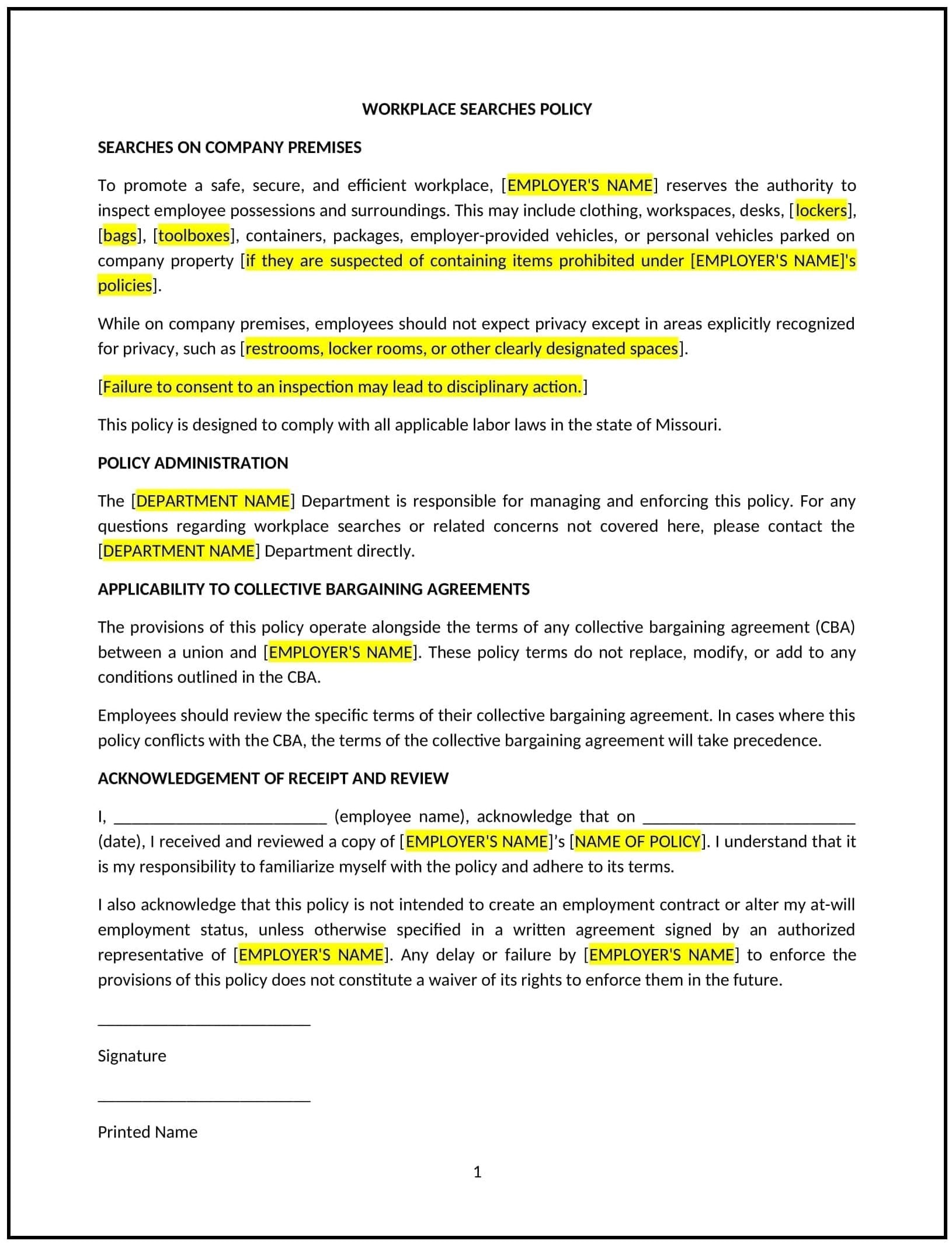Workplace searches policy (Missouri): Free template
Got contracts to review? While you're here for policies, let Cobrief make contract review effortless—start your free review now.

Customize this template for free
Workplace searches policy (Missouri)
A workplace searches policy helps businesses in Missouri establish clear guidelines for conducting searches of employees' personal belongings, including bags, desks, or vehicles, to ensure the safety and security of the workplace. This policy outlines when and how searches may be conducted, the process for notifying employees, and the protections employees have during a search. It is designed to prevent theft, workplace violence, and other security issues while balancing employee privacy rights.
By adopting this policy, businesses can maintain a safe work environment, deter misconduct, and clarify expectations regarding workplace searches.
How to use this workplace searches policy (Missouri)
- Define the scope of searches: Clearly specify which personal belongings or areas may be subject to search, such as desks, lockers, personal bags, and vehicles parked on company property. The policy should define the circumstances under which searches may be conducted.
- Set conditions for searches: Outline the circumstances under which searches may occur, such as when there is reasonable suspicion of theft, violation of company policies, or safety concerns. Ensure that searches are conducted fairly and consistently.
- Address employee consent: Specify whether employees are required to consent to searches, and outline the process for obtaining consent. If applicable, explain any consequences of refusing a search, such as disciplinary action.
- Provide notice requirements: Establish how employees will be notified about the search policy and any specific searches that may take place, including whether searches will be conducted randomly or on a case-by-case basis.
- Maintain confidentiality: Ensure that any searches and the results of those searches are handled confidentially to respect employee privacy and to avoid unnecessary embarrassment or discrimination.
- Ensure respect and professionalism: Emphasize that searches will be conducted respectfully and professionally to maintain a dignified environment for employees. Specify that searches will be done by trained personnel.
- Review regularly: Periodically review and update the policy to ensure it complies with Missouri state laws, reflects changes in the workplace environment, and aligns with best practices for employee privacy and safety.
Benefits of using this workplace searches policy (Missouri)
This policy provides several benefits for businesses in Missouri:
- Promotes workplace security: A clear policy helps deter theft, violence, and the use of illegal substances in the workplace, creating a safer environment for all employees.
- Clarifies expectations: By defining when and how searches may be conducted, the company sets clear expectations for employees, which helps prevent misunderstandings or disputes.
- Reduces legal risks: A well-defined search policy ensures that searches are conducted in a way that complies with Missouri state law and respects employee privacy, reducing the risk of legal challenges.
- Maintains fairness: A consistent and transparent policy ensures that searches are applied fairly to all employees, helping to prevent claims of favoritism or discrimination.
- Protects company assets: Workplace searches can help prevent the theft or misappropriation of company property, reducing losses and protecting business assets.
- Supports employee safety and well-being: By maintaining a secure workplace, the policy supports the safety and well-being of all employees, reducing the risk of workplace violence or dangerous behavior.
Tips for using this workplace searches policy (Missouri)
- Communicate the policy clearly: Ensure that all employees are aware of the policy, including its scope, procedures, and the circumstances under which searches may occur. Provide clear documentation during onboarding and in the employee handbook.
- Obtain consent when necessary: Make sure that employees understand the consent process and provide written acknowledgment if required. Ensure employees are aware of the consequences if they refuse a search.
- Handle searches with professionalism: Searches should be conducted respectfully and professionally by designated personnel to ensure that employee dignity and privacy are maintained throughout the process.
- Ensure consistency: Apply the search policy consistently across all employees to ensure fairness and avoid potential claims of discrimination or bias.
- Maintain privacy and confidentiality: Ensure that any information gathered during searches is kept confidential and only shared with relevant parties within the company.
- Review regularly: Periodically review and update the policy to ensure it remains in compliance with Missouri state laws, reflects best practices for workplace safety, and meets the company’s evolving needs.